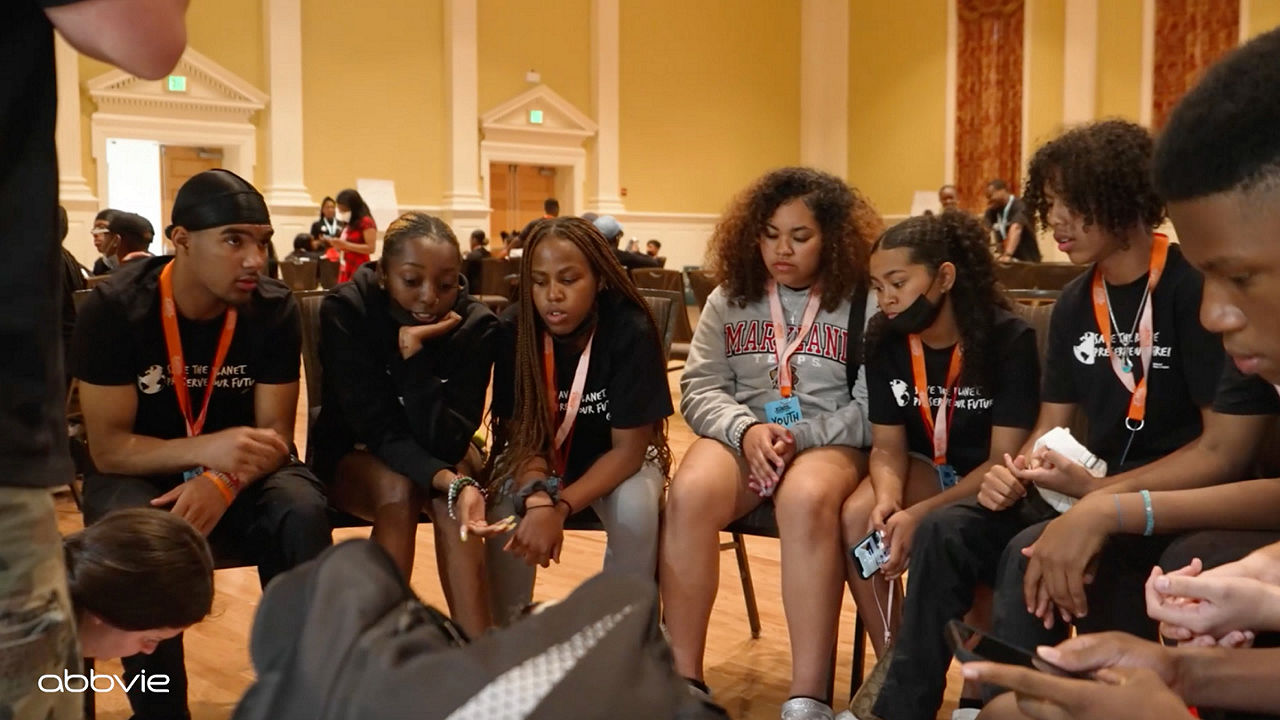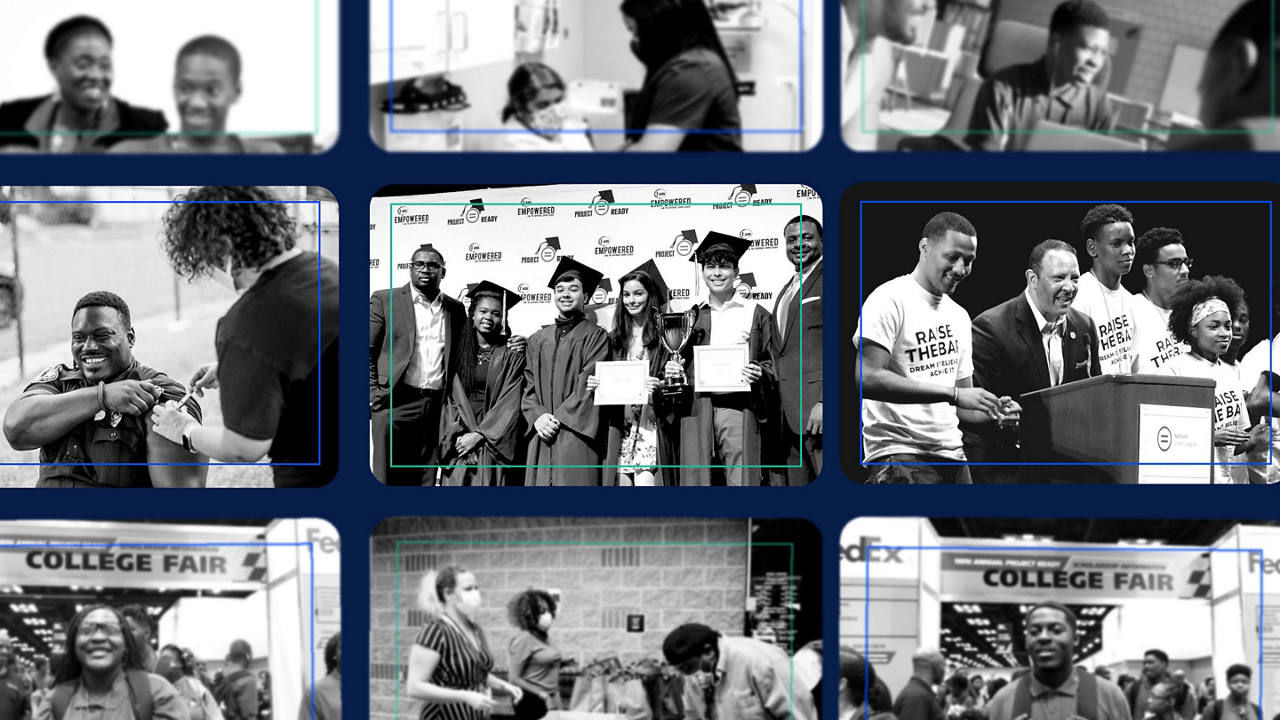Learn more about their cumulative progress.
AbbVie Foundation Partners Scale Efforts to Advance Racial Equity
See the cumulative progress made by our six nonprofit partners driving health and education equity for historically marginalized groups
When Chicago native Michelle Williams became pregnant at age 15, she knew challenges would lie ahead but she also knew this – she wouldn’t become just a statistic.
“At that time, I was told my life would be ruined, that I wouldn’t have a future, but I was determined to prove everyone wrong,” she recalled.
With the support of her family, Michelle set out to build a better future for herself and her son by choosing to pursue a career in nursing. She got her CNA license, then obtained a degree in health sciences. But when it came time to enter her nursing program, she encountered another roadblock – the high cost of tuition. Supported by an AbbVie-funded scholarship from the United Negro College Fund (UNCF), Michelle now has the opportunity to finish her degree.
“This scholarship is championing me as a mother, as a student, as a scholar,” she says. “It encourages me to continue to persist and proceed beyond all the things everyone told me I could not. It gives me that inspiration and I'm truly grateful for that.”
UNCF’s scholarship program is one of six initiatives the AbbVie Foundation supports as part of its $50 million, five-year commitment to advance racial equity, which launched in 2020. Driven by partners like UNCF, this commitment seeks to create greater health and education equity and workforce development opportunities through programs empowering Black and other marginalized groups.
“Advancing health and education equity have been integral to AbbVie since our company was founded in 2013,” said Claudia Carravetta, President, AbbVie Foundation; Vice President, Corporate Responsibility & Global Philanthropy, AbbVie. “Since our founding, we have invested more than $168 million in philanthropic programs that purposefully support diverse communities.”
After three years of partnership, the AbbVie Foundation’s six racial equity partners have made significant strides. Explore some of their key accomplishments and learnings.
27K+
people served by community health care workers
(University of Chicago Medicine’s Urban Health Initiative)
~5,000+
young adults developed technical and professional skills through a training and internship program
(Year Up)
800+
scholarships and support services delivered to students pursuing careers in health care
(United Negro College Fund)
45+
scholarships awarded to high school students with high academic potential
(Providence St. Mel)
300
mentors supported over 2000 youth across 17 U.S. cities
(National Urban League)
30
community organizations awarded grants to advance health equity
(Direct Relief)
University of Chicago Medicine's Urban Health Initiative
In Chicago, health disparities persist for Black Chicagoans and widen further when comparing specific neighborhoods. As of 2019, the life expectancy gap between the downtown Streeterville area and Englewood, a South Side neighborhood just a few miles away, was 30 years.
With the AbbVie Foundation’s support, the University of Chicago’s Urban Health Initiative (UHI) is working to lower such disparities through its Liaison in Care (LinC) program. Since launching LinC in Chicago’s South Side, the program’s 10 full-time community health workers, and an additional 10 community health workers funded through grants to local organizations, have helped over 27,000 residents navigate care and connect to relevant health and social service resources proven to measurably reduce health disparities.
According to Brenda Battle, senior vice president of community health transformation and chief equity officer, University of Chicago Medicine, one of the most significant accomplishments made during this time is the expansion of support for patients with conditions that have not typically had access to community health workers.
“One example of that is sickle cell anemia. Adolescent patients with sickle cell anemia looking to move into adult care typically have fewer resources,” Battle says. “We’ve leveraged community health workers to help these patients transition into care at that next level, and through this ongoing engagement we’ve seen reduced emergency room visits, reduced hospitalizations and persons with sickle cell disease getting the care that they need.”
Direct Relief
Among those fighting to advance health equity are local community organizations. To support their efforts, the AbbVie Foundation donated $10 million to seed Direct Relief’s Fund for Health Equity. Over the past three years, AbbVie’s donation enabled the fund to award 30 grants to community health centers, free and charitable clinics, and other nonprofit organizations eliminating health disparities through non-clinical interventions that affect a person’s health – commonly known as the social determinants of health. In that time, the cohort of grantees funded by the AbbVie Foundation served over 14,000 patients, of which 46% were Black and 31% were Hispanic/Latinx.
United Negro College Fund (UNCF)
AbbVie Foundation’s support empowered UNCF to launch and scale its Healthcare Diversity Workforce Program, which offers support to students interested in a health care career, but might otherwise not have an opportunity to go beyond high school. Among those supported are single parents like Michelle, for whom the out-of-pocket cost of attending a public college can be 2 to 5 times higher compared to their peers without children when factoring expenses such as childcare, wages and college affordability. Since 2021, the program has awarded scholarships and wraparound support services to over 800 students. In doing so, the program seeks to reduce barriers to advancement in health professions and increase the number of Black professionals in a wide variety of health care careers.
Providence St. Mel
For 45 years, 100% of the graduates of Providence St. Mel School (PSM)—a predominantly Black preschool-12th grade school in Chicago— have been accepted to four-year colleges and universities. Through its partnership with the AbbVie Foundation, PSM is expanding educational opportunities through scholarships. Over the past two years, the school has awarded 47 scholarships to high school students living in Chicago’s south and west sides based on financial need and academic potential. AbbVie Foundation support has also enabled PSM to widely deploy its Academic Intervention Model, which is designed to help close the achievement gap by identifying, assessing and giving individualized support to students would otherwise would not have the opportunity to get a premier college education.
National Urban League (NUL)
Mentorship can play a key role in advancing equity in education. According to research, quality mentoring relationships positively affect young people in various personal, academic, and professional situations. However, 1 in 3 young people will grow up without a mentor. To fill this gap, the AbbVie Foundation made a $7 million commitment to Project Ready Mentor, NUL’s signature mentorship program. Project Ready Mentor explicitly targets 11 to 18-year-old African American and other urban youth who are particularly vulnerable to disengagement from school, community and the workforce. The AbbVie Foundation’s support enabled NUL to scale up the program across 17 U.S. cities and leverage nearly 300 mentors to support over 3000 youth.
“At each step of our partnership with the AbbVie Foundation, there’s been reciprocal, transparent learning,” Hal Smith, Ed.D., senior vice president for education youth development and health, National Urban League.
Year Up
Job skills training and internships can create a pathway for youth to achieve economic mobility. However, research shows that only 59.5% of Black students and 53.3% of Latinx students participate in internships, compared to 68.2% of White students. To bring more equitable access to opportunities, the AbbVie Foundation committed $10 million to Year Up’s training and internship program. The program gives young adults technical and professional skills and real-world work experience so they can achieve economic mobility. With this support, Year Up’s program in Boston, the Bay Area, Chicago, and New York/New Jersey have served close to 5,200 young adults.
Expanding the impact and reach of programs in the future
Looking ahead, partners are focused on further scaling their work, expanding the reach of their programs and sharing key learnings with other community partners.
“The ability to share what worked in one community to reduce or eliminate disparities, I think is one of the most meaningful and powerful things. It’s what ensures this work delivers an impact that’s lasting,” said Byron Scott, M.D., co-chair of the Fund for Health Equity and board director, Direct Relief.
Watch a panel discussion featuring three of our six partners to learn more about the insights AbbVie Foundation partners have gained and what drives their ongoing commitment. Watch now
Media inquiries:
[email protected]


